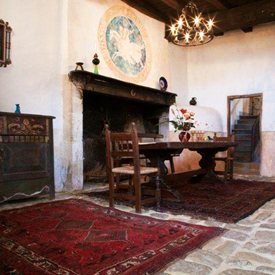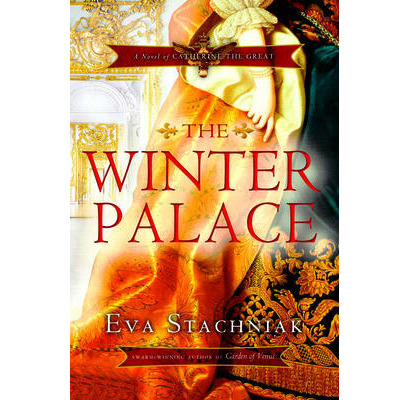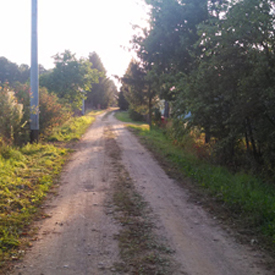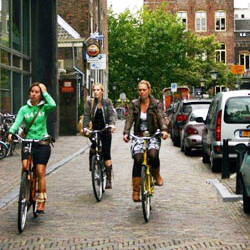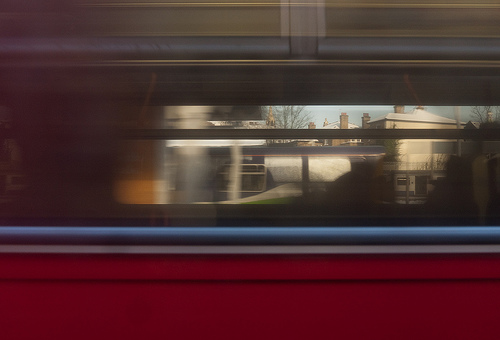 It was 1967. I was twenty-four, a freshly-minted architecture graduate spending a year abroad. After driving through France and Spain, and an idyllic several months on the island of Formentera, I was back in Paris, staying with my uncle and aunt, before returning to Canada. But first, I wanted to visit Poland. I had been born in Edinburgh and now lived in Montreal, but both my parents were Polish, and many of my relatives were in Poland. It was not family obligations that drew me, however, but curiosity. All my childhood I had heard my parents tell stories about their lives in prewar Poland, and for me these stories had something of the quality of once-upon-a-time fairytales—not quite real, but potent nevertheless. And now I had a chance to visit the princess’s castle, touch the beanstalk, perhaps even to glimpse Rumpelstiltskin.
It was 1967. I was twenty-four, a freshly-minted architecture graduate spending a year abroad. After driving through France and Spain, and an idyllic several months on the island of Formentera, I was back in Paris, staying with my uncle and aunt, before returning to Canada. But first, I wanted to visit Poland. I had been born in Edinburgh and now lived in Montreal, but both my parents were Polish, and many of my relatives were in Poland. It was not family obligations that drew me, however, but curiosity. All my childhood I had heard my parents tell stories about their lives in prewar Poland, and for me these stories had something of the quality of once-upon-a-time fairytales—not quite real, but potent nevertheless. And now I had a chance to visit the princess’s castle, touch the beanstalk, perhaps even to glimpse Rumpelstiltskin.
I took the Paris-Moscow express to Warsaw. An overnight journey in a second-class coach, with lengthy border stops in East Germany and East Berlin, where armed border guards with dogs inspected the undersides of the cars. At last we reached the Polish frontier. “Arriving Poland,” I wrote in my notebook, “getting drunk on wine and beer and looking out the window at the fields and the flowers and brick houses, the pine trees straight as arrows, each blade of grass, men scything, swallows, the old guy next to me, like some kind of bald grizzly bear, is digging it all, too, although he is coming back, and I am here for the first time.”
My initial impressions of Poland were confusing. People often asked me, “Jak Ci się podoba?” (How do you like it here?) It was hard to answer. The country, still ruled by a Communist regime, appeared more foreign than Paris or even Formentera. Almost no consumer goods, long lines everywhere, the people—like the city—slightly shabby and down-at-the-heel. The city, almost completely destroyed during the war, had been rebuilt, but except in the restored historic district the architecture was unremarkable, and the rows of utilitarian housing blocks looked downright dreary. A rare building that showed some architectural panache was the Palace of Culture, which everyone I met hated because it was a “gift” from the Soviet people, and moreover wasn’t “modern.” In Poland, modern architecture was equated with Western Europe and liberalism; the only modernist buildings I saw were factories.
Restaurants had plentiful, if basic, food, but occasionally ran out of staples like beer. As a habitué of Montreal taverns, I considered myself something of an expert on beer, and an economy that couldn’t organize the delivery of beer was, I understood, in trouble. “Here, instead of capitalism, there is capitalizing on friendships and connections,” I wrote in a letter home. “You get a pair of shoes through a friend, a job through a friend, you get your children into university through a friend. That is how it is—communism doesn’t work because it is not suited to human beings.”
There was plenty of vodka, though, judging by the numbers of staggering drunks in the street, day or night. I visited Super Sam, the city’s first supermarket, which was distinguished by its large size—and its empty shelves. Bookshops had beautiful and cheap art books, but I couldn’t find a good Polish-English dictionary. The bureaucracy was Kafkaesque, and there was always the oppressive shadow of the Soviet Union in the form of immaculately uniformed Russian soldiers. The Poles I met were resigned, cynical, and funny yet, in a curious way, life was more relaxed and less hurried than in the West.
I stayed with my grandmother in the same apartment where my parents had lived thirty years before. She told me about her life before the war—przed wojną—and showed me photographs of my youthful parents and of my grandfather’s hunting trips. She still had some of his trophies on the wall, including a pair of boar’s tusks with a gold medal that had been presented to him at Berlin’s 1937 International Hunting Exhibition by that enthusiastic German hunter, Hermann Göring. We went to the Łazienki Gardens together and ate ice cream on a park bench. She was a charming lady who must have been very beautiful as a young woman. I sought out her old house on Mokotowska Street, where my mother had grown up. The structure was as grand as I had been told, with a handsome Palladian façade punctuated by regularly spaced pedimented windows. The building had been converted into a university students’ club, and I didn’t go inside.
After a few weeks, I lost my English accent and passed undetected. But it still felt odd. I had learned to speak Polish as a child, and it was a private language that I only used with my parents and their friends, never with strangers. Now I talked to bus drivers and waitresses. The difference was exacerbated by the fact that Polish is an unusually courtly language—compared to English—with different words and forms of address, depending on whether one is talking to a family member, a colleague, or a stranger. So I had to learn that, too.
I traveled to Krakow, met more cousins, went to museums and theaters, and spent two weeks in Bukowina, hiking in the Tatra Mountains. My aunt took me on an outing to an eleventh-century salt mine at Wieliczka. One day, I took a train to Tarnów, fifty miles from Krakow, where my other grandfather had taught school. It was a sleepy country town, just as I had imagined. A local bus dropped me at the hamlet of Lusławice, and I easily found the dwór, or manor house, where my grandfather had lived—a house guest for several decades. Another Palladian villa, a large farm house, really, but with an elegant central portico supported by Doric columns. The large grounds were overgrown and the building was boarded up. I walked on up the road, and after asking directions, located the village cemetery. The graves were scattered beneath a grove of trees. I found my grandfather’s tombstone; it gave me a frisson to read his name—I am his namesake. It was a hot summer’s day, but cool in the dark shade. All around was a rolling landscape of open fields and meadows, bright in the glaring sun. It was heart-rendingly beautiful.
I stayed in Poland for one month, and then extended my visa for a second. I didn’t know what I was looking for, but if I expected an epiphany, it never came. This wasn’t home, and I didn’t really feel Polish. Yet, I could recognize traces of my Polishness—I wasn’t entirely a stranger. The countryside, the old buildings, the faces on the street, all felt vaguely familiar. It was as if I had seen them a long time ago, or heard of them, or at least imagined them. Does that sound far-fetched? Or just a well-worn cliché? Perhaps I merely wanted to experience something of my parents’ fairy tales. Maybe I simply needed their stories to become real, in order to exorcise them from my imagination. CR
Imagery
“Train blur” by swh from creativecommons.org
